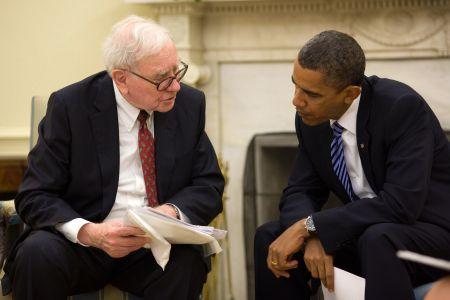Warren Buffett is Upbeat on the Economy. Here's Why.
Published: Feb 29, 2016

"For 240 years it’s been a terrible mistake to bet against America, and now is no time to start. America’s golden goose of commerce and innovation will continue to lay more and larger eggs. America’s social security promises will be honored and perhaps made more generous. And, yes, America’s kids will live far better than their parents did. "
In his most recent letter to Berkshire Hathaway shareholders, billionaire investor and living legend Warren Buffett devoted a significant section to his unshakeable faith in the US economy. His remarks come against the backdrop of the heightening clamor of the presidential election cycle and its accompanying negative drumbeat about the economy—and, as can be seen in the excerpt above—it appears to be directed at dispelling these concerns.
In particular, Buffett took on the notion that the current slow growth rate of the economy—projected at 2% for the foreseeable future—means that we're on a road to a place where millennials and those who come after them are likely to have a worse lifestyle than their parents. Here's what the Sage of Omaha had to say on that particular point:
"That view is dead wrong: The babies being born in America today are the luckiest crop in history. American GDP per capita is now about $56,000. As I mentioned last year that – in real terms – is a staggering six times the amount in 1930, the year I was born, a leap far beyond the wildest dreams of my parents or their contemporaries."
Citing productivity as the chief reason for all that economic growth, Buffett also noted that the current growth rate, when compounded, is likely to have a similar effect: greatly increased GDP over a time-frame of a quarter-century as more. Add in technological advancement, and it's entirely possible that the lifestyle we're leading today will seem as quaint and primitive to future generations as one example Buffett cites from his own youth:
"Today’s politicians need not shed tears for tomorrow’s children. Indeed, most of today’s children are doing well. All families in my upper middle-class neighborhood regularly enjoy a living standard better than that achieved by John D. Rockefeller Sr. at the time of my birth. His unparalleled fortune couldn’t buy what we now take for granted, whether the field is – to name just a few – transportation, entertainment, communication or medical services. Rockefeller certainly had power and fame; he could not, however, live as well as my neighbors now do."
One final point to note from Buffet's annual treatise, meanwhile, lends a much-needed sense of perspective in an age where political impasse seems like the norm. Pointing out that people have always had different ideas about how best to facilitate the spread of wealth—and what constitutes an acceptable spread—Buffett notes that even those who are on the "losing" sides will have significantly more in terms of goods and services at their disposal than in previous generations. (This presumably assumes that all this extra consumption doesn't come at un unsustainable environmental cost).
Amid all the gloom of the daily news cycle, then, perhaps it truly does pay to keep your eye on the long-term prize--in your career as well as your portfolio.

